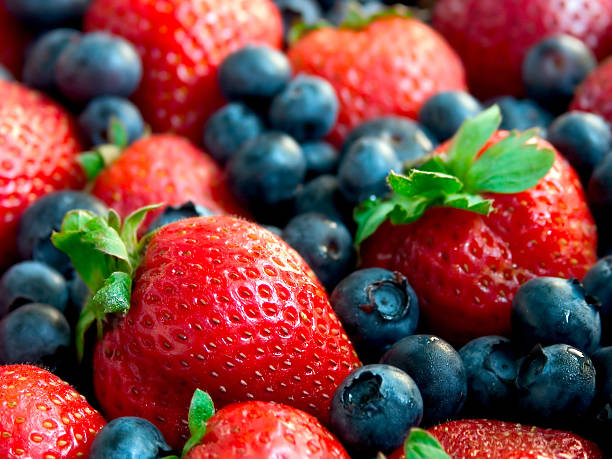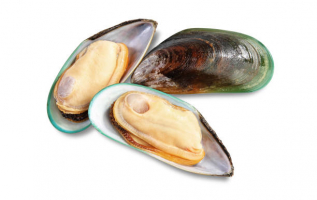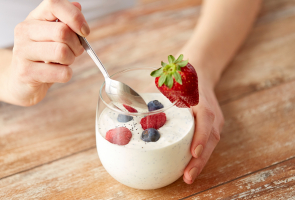Top 7 Health Benefits of Eating Strawberries
Strawberries are a popular summertime fruit. The luscious berries may be found in everything from yogurt to sweets to salads. Strawberries, like other berries, ... read more...have a low glycemic index, making them a pleasant alternative for persons trying to regulate or lower their glucose levels. Although June is traditionally the greatest month for picking fresh strawberries, the red berries are accessible in shops all year. They are wonderful fresh or cooked in a variety of sweet and savory ways. Now, let's look at the finest health advantages of strawberries.
-
Memory loss and loss of control of muscular action are frequent in older individuals owing to normal aging. However, in younger individuals, free radicals can promote accelerated aging of the brain and nervous system. Free radicals, a damaging consequence of cell metabolism, cause oxidative stress, which deteriorates neurons. Strawberries, on the other hand, are high in vitamin C and polyphenols, which aid to revitalize the neurological system. Strawberries are also high in iodine, which is essential for the correct functioning of the brain and nerve system.
Similarly, potassium, which is contained in strawberries in small amounts, has been linked to increased cognitive performance through increased blood flow to the brain. According to recent research on students, a high intake of potassium and fisetin, the flavonol that gives strawberries their crimson color, improves memory and may help prevent Alzheimer's disease in the long term.

Enhance Cognitive Function 
Enhance Cognitive Function -
Strawberries may be high in heart-healthy antioxidants including ellagic acid as well as flavonoids like anthocyanin, catechin, quercetin, and kaempferol. According to one study, these phenolic chemicals reduce the risk of cardiovascular disease by preventing the development of total and LDL (bad) cholesterol. Another Harvard Medical School study discovered that young and middle-aged women who ate three or more half-cup portions of strawberries or blueberries per week were 34% less likely to suffer a heart attack.
The berries' potentially high quantities of anthocyanins relax blood vessels, lowering blood pressure and reducing cardiovascular issues. Strawberries' high fiber content, vitamin C, and folate content make them a perfect heart health triumvirate. They have the ability to lower cholesterol levels in the arteries and vessels.

Improve Heart Function 
Improve Heart Function -
As a consequence of cellular metabolism, free radicals are continually created throughout the body. These toxic byproducts are to blame for the transformation of healthy cells into malignant ones. A serving of strawberries will do you wonders. Strawberries include a variety of nutrients, including vitamin C, anthocyanins, kaempferol, folate, and quercetin. Special components found in strawberries called flavonoids have the power to fight cancer and oxidative stress. These flavonoids, such as anthocyanins, quercetin, and kaempferol act as a defensive line against the development of cancer and tumors.
Together, these flavonoids contribute to the strawberry's antioxidant and anticarcinogenic properties. A regular portion of the fruit can help improve your immune system and slow tumor growth. Strawberry consumption appears to be associated with a significant reduction in cancer cell metastasis, which may assist to augment therapy that is being delivered concurrently.

Help Prevent Cancer 
Help Prevent Cancer -
Strawberries can help protect your skin from pollution and UV rays. According to a 2017 Italian study, strawberry-based cosmetic formulations can protect the skin from UV-induced damage. Using strawberry masks on a regular basis might help to maintain the skin fresh and clear. Because of their antioxidant characteristics, strawberries may be effective in avoiding free radical-induced skin damage, according to another study. Strawberry's high concentration of vitamin C suppresses free radical activity, which can cause premature skin aging symptoms such as fine lines, dullness, and sagging skin.
Crush 4-5 strawberries and combine the pulp with a tablespoon of honey to produce a simple face mask for bright skin. Apply to the face, wait for it to dry, and then wash it off. Strawberry lip balms also assist to keep lips moistened.

Aid in Skin Care 
Aid in Skin Care -
The production of free radicals causes the bulk of eye-related diseases. Because of aging and a lack of protective nutrients, free radicals can cause substantial eye damage such as optic nerve degeneration, increased susceptibility to eye infections, and macular degeneration, among other things. Strawberries are high in Ellagic acid, flavonoids, and phenolic phytochemicals, which aid to avoid such issues to a considerable extent. Strawberries also contain potassium, which aids in the regulation of ocular pressure.
Strawberry consumption can help avoid eye disorders such as dry eyes, optic nerve degeneration, macular degeneration, visual abnormalities, and increased susceptibility to infections. Strawberries were recommended in a study looking into dietary remedies for age-related eye disorders due to their potentially high vitamin C content. It was discovered in the journal Clinical Interventions in Aging that vitamin C offered crucial antioxidant protection to the eye. Another study published in the journal Nutrients in 2018 identified vitamin C as a key component in the regeneration of ocular tissues. It evaluated much research and concluded that vitamin C-rich foods such as strawberries might help prevent glaucoma.

Improve Eyesight 
Improve Eyesight -
Strawberries have a low glycemic index, which may reduce the risk of acquiring type 2 diabetes, according to research published in the British Medical Journal. Another Canadian Institutes of Health Research-funded study found that consuming strawberries improved glycemic control in persons with diabetes. Another study found that it can aid in the management of hyperglycemia-linked type 2 diabetes.
Strawberries may be delicious, but they are also good for diabetes people. Strawberry has a low glycemic index and a high fiber content, making it an excellent fruit choice. Researchers discovered in 2011 that eating 37 strawberries per day can successfully reduce diabetes consequences such as renal damage and neuropathy.

Aid in Managing Diabetes 
Aid in Managing Diabetes -
Strawberries are incredibly healthy and have a high water content (approximately 91 percent water by weight), which contributes to their low-calorie value. A 1-cup (150-gram) portion of raw strawberries has just 50 calories and 3 grams of nutritional fiber. Strawberries are high in soluble fiber, which absorbs water and develops a gel-like consistency in the digestive tract. According to research, soluble fiber can help manage your appetite by slowing your stomach's emptying pace and increasing fullness feelings.
Furthermore, evidence shows that eating more fruit may be related to a decreased risk of weight gain over time. Although strawberries contain natural sugar, the fiber component slows digestion and absorption into circulation. As a result, the naturally occurring sugars in strawberries are unlikely to have the same blood-sugar consequences as added sugars found in meals such as soda, candy, and desserts.

Aid in Weight Loss 
Aid in Weight Loss




























